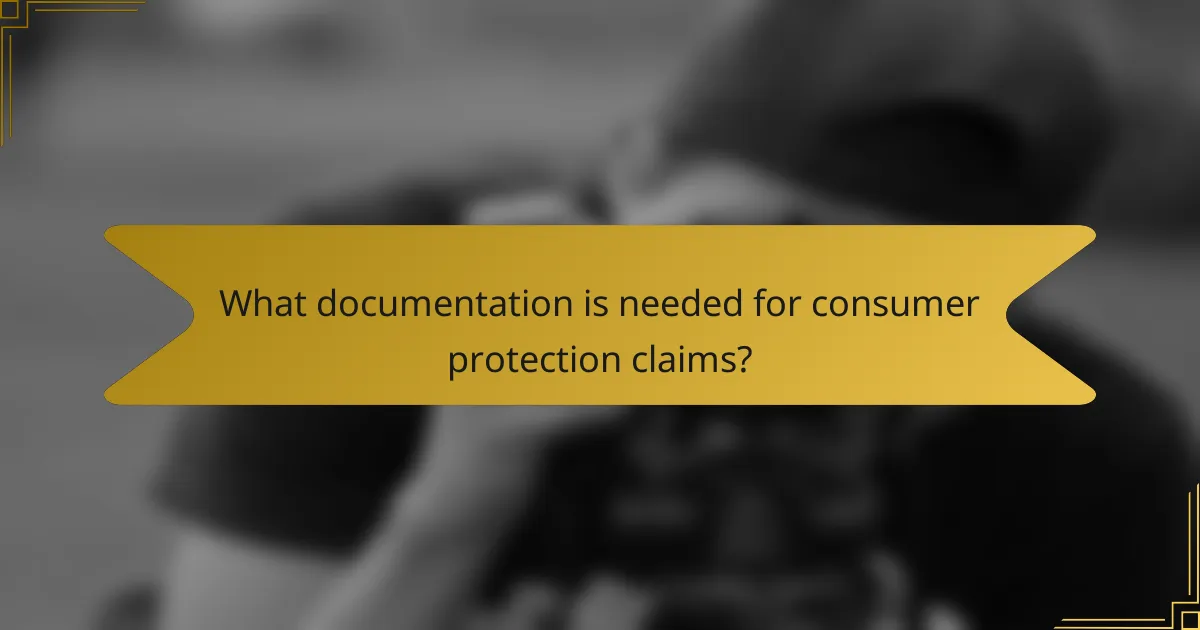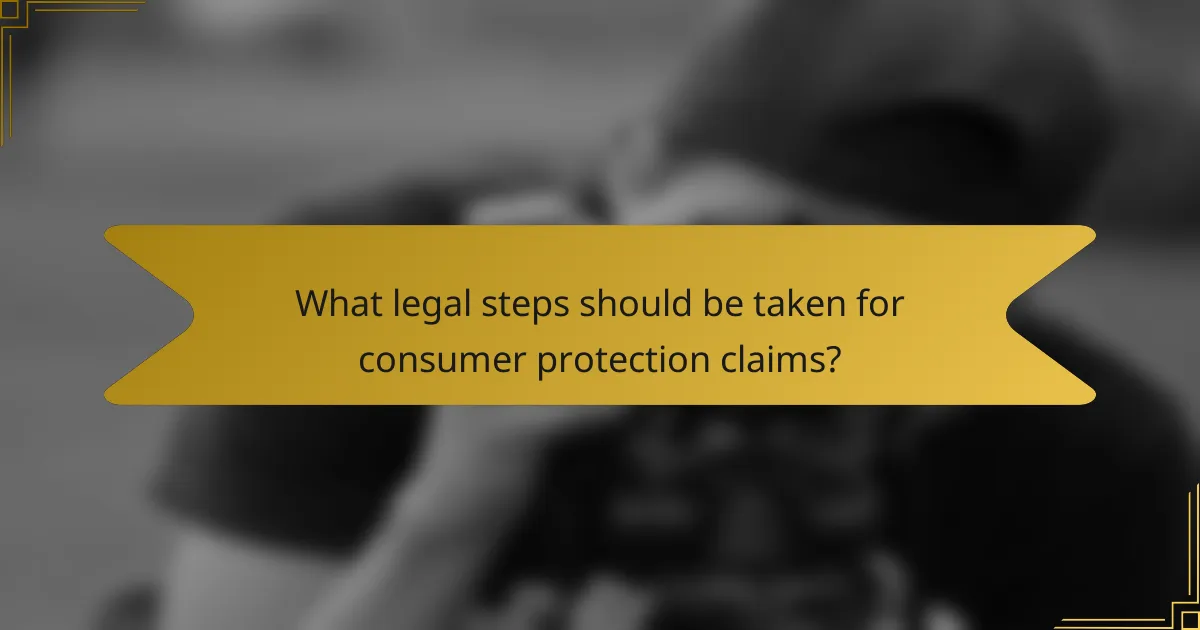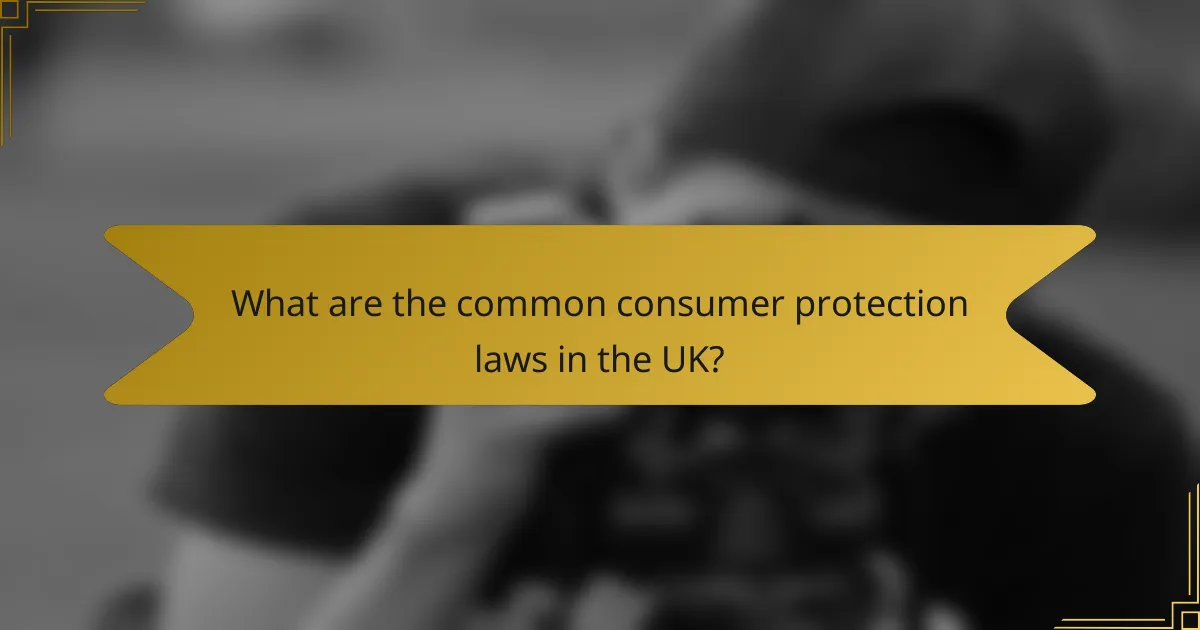Consumer protection claims are vital for addressing issues related to faulty products or unsatisfactory services. To navigate this process effectively, it’s important to report your concerns through the appropriate channels, gather necessary documentation, and understand the legal steps involved. By following a structured approach, you can ensure your rights are protected and seek the compensation you deserve.

How to report consumer protection issues in the UK?
Reporting consumer protection issues in the UK involves several steps to ensure your concerns are addressed effectively. You can seek guidance from various organizations, file formal complaints, or utilize online tools to document your issues.
Contact the Citizens Advice Bureau
The Citizens Advice Bureau (CAB) provides free, confidential advice on consumer rights and issues. You can visit a local CAB office or access their services online to discuss your situation and receive tailored guidance.
When contacting the CAB, be prepared to provide details about your issue, including any relevant receipts or correspondence. They can help you understand your rights and the next steps to take.
File a complaint with the relevant regulatory body
Depending on the nature of your consumer issue, you may need to file a complaint with a specific regulatory body. For example, financial services complaints can be directed to the Financial Ombudsman Service, while issues with energy suppliers may go to Ofgem.
Each regulatory body has its own procedures for handling complaints, so it’s essential to follow their guidelines carefully. Gather all necessary documentation, such as contracts and communication records, to support your case.
Use online reporting tools
Several online platforms allow consumers to report issues quickly and efficiently. Websites like Resolver and Which? provide structured processes for submitting complaints and tracking their progress.
Using these tools can streamline the reporting process, ensuring that your complaint reaches the right parties. Make sure to keep copies of all communications and any reference numbers provided during the process.

What documentation is needed for consumer protection claims?
To effectively pursue consumer protection claims, specific documentation is essential. This includes proof of purchase, correspondence with the seller, and photographic evidence of the issue at hand.
Proof of purchase
Proof of purchase is crucial for substantiating your claim. This can include receipts, invoices, or bank statements showing the transaction. Ensure that the documentation clearly indicates the date of purchase, the item or service acquired, and the amount paid.
When submitting proof of purchase, keep copies for your records. If the original document is lost, check with the seller for a duplicate or alternative verification methods.
Correspondence with the seller
Documenting all correspondence with the seller is vital for your claim. This includes emails, chat logs, and any written communication regarding the issue. Make sure to note dates, times, and the content of discussions to establish a clear timeline of events.
When communicating with the seller, maintain a professional tone and keep records of all responses. This documentation can support your case if the matter escalates to legal action.
Photographic evidence of the issue
Photographic evidence is important for visually demonstrating the problem with the product or service. Take clear, detailed photos that highlight the issue, such as defects or damages. Ensure that the images are timestamped, if possible, to establish when the issue occurred.
Consider taking multiple angles or close-ups to provide a comprehensive view of the problem. This evidence can significantly strengthen your claim by providing tangible proof of your concerns.

What legal steps should be taken for consumer protection claims?
To effectively pursue consumer protection claims, it’s essential to follow a structured approach that includes seeking legal advice, considering alternative dispute resolution methods, and potentially filing a claim in small claims court. Each step plays a crucial role in ensuring your rights are upheld and that you receive appropriate compensation.
Seek legal advice from a solicitor
Consulting a solicitor can provide clarity on your rights and the viability of your consumer protection claim. A legal expert can assess your situation, guide you through the complexities of consumer law, and help you understand the potential outcomes.
When choosing a solicitor, look for someone with experience in consumer protection cases. They can help you gather necessary documentation and prepare for any legal proceedings, ensuring you are well-informed and supported throughout the process.
Consider alternative dispute resolution
Alternative dispute resolution (ADR) offers a way to resolve consumer disputes without going to court. This can include mediation or arbitration, which are often quicker and less costly than traditional litigation.
ADR can be particularly effective for resolving claims involving lower amounts, typically under a few thousand dollars. It’s advisable to check if the company you are dealing with has an ADR scheme in place, as many businesses are required to offer this option under consumer protection regulations.
File a claim in small claims court
If other resolution methods fail, filing a claim in small claims court may be necessary. This court is designed to handle disputes involving relatively small amounts of money, often up to a few thousand dollars, depending on the jurisdiction.
Before filing, ensure you have all relevant documentation, such as receipts, correspondence, and any evidence supporting your claim. Small claims court procedures are generally straightforward, but it’s wise to familiarize yourself with the specific rules and limits in your area to avoid common pitfalls.

What are the common consumer protection laws in the UK?
In the UK, consumer protection laws are designed to safeguard the rights of individuals when purchasing goods and services. These laws ensure that consumers receive fair treatment and can seek redress when issues arise.
Consumer Rights Act 2015
The Consumer Rights Act 2015 consolidates various consumer rights into one comprehensive framework. It covers the sale of goods, services, and digital content, ensuring they are of satisfactory quality, fit for purpose, and as described.
If a product is faulty or not as described, consumers have the right to a refund, repair, or replacement. It is crucial to report issues promptly, typically within 30 days of purchase, to ensure eligibility for these remedies.
Trade Descriptions Act 1968
The Trade Descriptions Act 1968 prohibits false or misleading descriptions of goods and services. This law protects consumers from deceptive marketing practices that could influence their purchasing decisions.
Businesses must ensure that any claims made about their products are accurate. If a consumer believes they have been misled, they can report the issue to Trading Standards, which can investigate and take action against the offending business.
Consumer Protection from Unfair Trading Regulations 2008
The Consumer Protection from Unfair Trading Regulations 2008 aims to prevent unfair commercial practices that could harm consumers. This includes misleading actions, aggressive sales tactics, and false advertising.
Consumers should be aware of their rights under these regulations, which allow them to report unfair practices. If a consumer feels they have been treated unfairly, they can contact the Competition and Markets Authority (CMA) for guidance and support in addressing the issue.

How to choose the right legal representation for consumer claims?
Selecting the right legal representation for consumer claims involves assessing the attorney’s expertise in consumer law and their reputation among previous clients. A knowledgeable lawyer can navigate the complexities of consumer protection laws and advocate effectively on your behalf.
Evaluate experience in consumer law
When choosing legal representation, prioritize attorneys with substantial experience in consumer law. Look for professionals who have handled cases similar to yours, as they will be familiar with relevant regulations and common challenges.
Consider asking potential lawyers about their track record in securing favorable outcomes for clients in consumer claims. An experienced attorney should be able to provide examples of past cases and the strategies they employed.
Check client reviews and testimonials
Client reviews and testimonials can provide valuable insights into an attorney’s effectiveness and client service. Look for feedback on legal websites, social media platforms, or local bar association listings to gauge overall satisfaction.
Pay attention to recurring themes in reviews, such as communication style, responsiveness, and success rates. A lawyer with consistently positive feedback is more likely to meet your expectations in handling your consumer claim.
